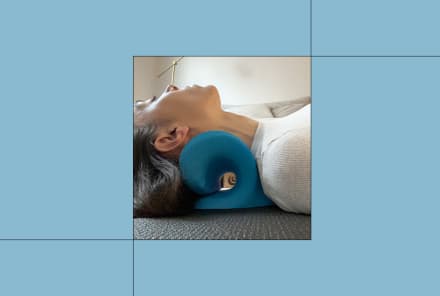Advertisement
3 Things You Probably Didn't Know About Fasting (Even We Were Surprised)


Fasting is arguably one of the oldest tools for health and well-being that we have. As journalist Steve Hendricks, author of The Oldest Cure in the World, declares on this episode of the mindbodygreen podcast, "It has 2,500 years of history… It appears in virtually every single major religion in the world; it appears in virtually every culture." And yet, there's so much about fasting that remains mysterious; and without proper research, many of the purported benefits continue to fly under the radar.
So in true journalistic fashion, Hendricks made it his mission to learn more about this effective tool (plus, what we're still getting wrong). The entire episode itself serves as a fasting FAQ—so be sure to lend an ear—but below, find three things about the eating strategy you probably didn't already know:
Fasting for health dates back to the 1800s.
Fasting has been part of religious rituals and ceremonies for centuries, but we can credit physician Henry Tanner, M.D., for using fasting as a therapeutic tool for healing. "Tanner was an eclectic doctor," Henricks shares, "and in 1877, he was living in Minneapolis and had a series of ailments. He had a heart condition, stomach condition… He decided to fast for however long it took to either cure himself or wither away and die." Sounds pretty bleak but as he went longer and longer without food, he actually noticed himself getting stronger. In 1880, Tanner was even invited to New York City to stage a "public fast" for all the folks who couldn't believe that you could fast for as long as he did.
"It became a sensation," says Hendricks. "His fast had planted seeds, and repeatedly over the next 10, 20, 30, 40, 50 years, other advocates of fasting would spring up and carry on the torch. And that is how we have gotten to this stage where it is, in fact, a therapeutic tool."
Fasting can change your taste buds.
"After you fast, your taste buds adapt, and food that didn't taste as good tastes good again," says Hendricks. For example, "When you have celery, you can taste the salt in the celery." Now, this effect is most extreme after a water-only fast; you might not experience this benefit after doing a modified fast (where you take in some calories), but it's interesting that introducing your body to food can enhance the flavors.
"In fact, when my wife and I were fasting, she broke her fast with a glass of celery and watermelon juice, and she almost couldn't drink it because it was just too salty for her," says Hendricks. "So this neural adaptation of your taste buds is one of the benefits of a water-only fast."
An earlier eating window may be better.
With intermittent fasting, it's important to choose the eating window that best works for your lifestyle. Everyone may have a different schedule, but if you can swing it, Hendricks recommends stacking your calories earlier in the day. "[Getting] the majority of your calories early in the day seems to be where the research is pointing," he notes.
Take this randomized controlled trial1, for example, which put participants with obesity on the same calorie-restricted diet. The only difference between the two groups was how they doled out those calories: "One of [the groups] took 70% of their calories at breakfast and lunch, and another took 55% of their calories at breakfast and lunch, and then the rest at dinner," Hendricks explains. "Without changing what they ate, just changing when they ate it, the group that took 70% of their calories at breakfast and lunch lost more weight [and] blood pressure went down." Neat, no?
It's certainly a case for a bigger breakfast. Even if fasting itself isn't doable for you, "the power of moving your calories earlier in the day and minimizing how much you're eating late is worth considering," Hendricks notes.
The takeaway.
Despite fasting's rich history as a health and well-being tool, we're still continuing to learn about the benefits. Of course, fasting isn't for everyone (especially those long, water-only fasts), and Hendricks recommends checking in with a medical professional before dabbling in the habit. However, simply starting small—perhaps even sticking to a 12-hour eating window—may serve you well.
We hope you enjoy this episode! And don't forget to subscribe to our podcast on iTunes, Google Podcasts, Spotify, or Amazon Music!
Watch Next
Enjoy some of our favorite clips from classes
Enjoy some of our favorite clips from classes
What Is Meditation?
Mindfulness/Spirituality | Light Watkins
Box Breathing
Mindfulness/Spirituality | Gwen Dittmar
What Breathwork Can Address
Mindfulness/Spirituality | Gwen Dittmar
The 8 Limbs of Yoga - What is Asana?
Yoga | Caley Alyssa
Two Standing Postures to Open Up Tight Hips
Yoga | Caley Alyssa
How Plants Can Optimize Athletic Performance
Nutrition | Rich Roll
What to Eat Before a Workout
Nutrition | Rich Roll
How Ayurveda Helps Us Navigate Modern Life
Nutrition | Sahara Rose
Messages About Love & Relationships
Love & Relationships | Esther Perel
Love Languages
Love & Relationships | Esther Perel
What Is Meditation?
Box Breathing
What Breathwork Can Address
The 8 Limbs of Yoga - What is Asana?
Two Standing Postures to Open Up Tight Hips
How Plants Can Optimize Athletic Performance
What to Eat Before a Workout
How Ayurveda Helps Us Navigate Modern Life
Messages About Love & Relationships
Love Languages
Advertisement

This Gave Me Osteoporosis At 32 & Here's What I Wish People Knew
AmiCietta Duche Clarke

New Study Shows This Vitamin May Lower Your Risk Of Alzheimer’s By 17%
Molly Knudsen, M.S., RDN

This Gave Me Osteoporosis At 32 & Here's What I Wish People Knew
AmiCietta Duche Clarke

New Study Shows This Vitamin May Lower Your Risk Of Alzheimer’s By 17%
Molly Knudsen, M.S., RDN













